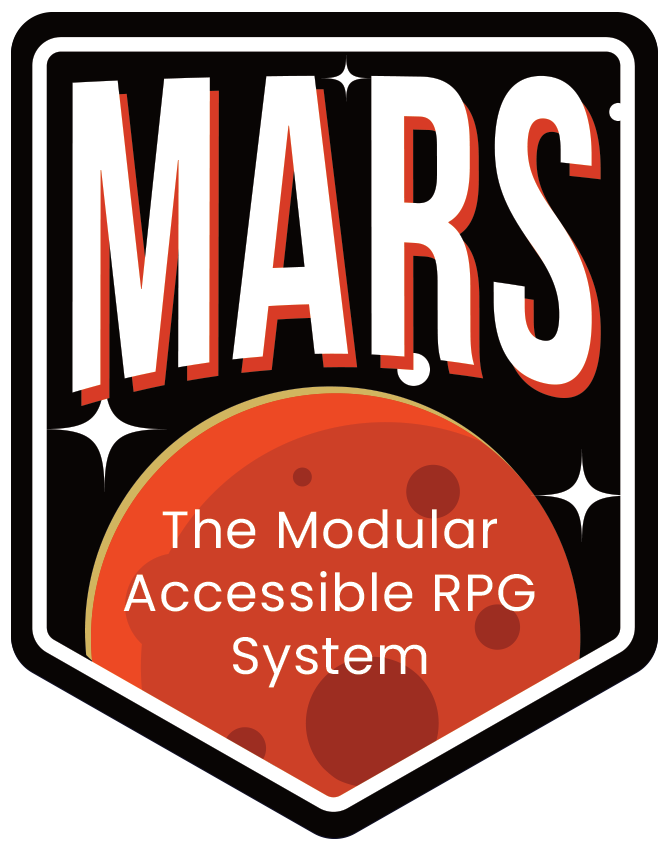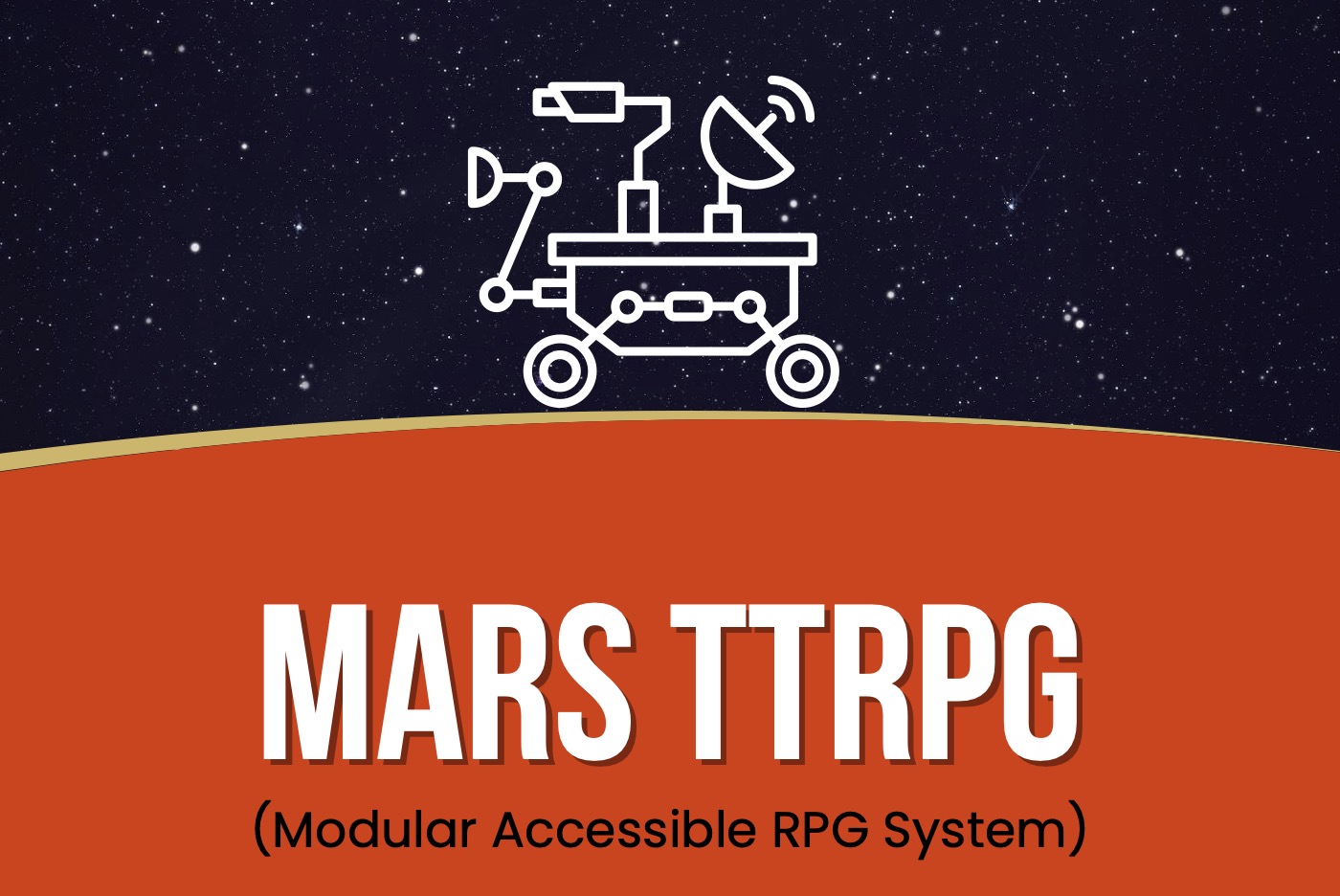Introduction
MARS Core is an RPG-on-a-page. The focus is on the shared narrative not detailed rules and mechanics. That said there’s plenty you can do with it, more than enough for a One-shot and then some!
MARS Core is designed to be able to be used with RPG beginners, and can easily be made Safe For Work (SFW). In that situation, it’s recommended the rules are introduced to Players slowly during gameplay, section-by-section, usually in the order as written below.
Tell a cool story together
Under the Core Rules, Players and NPCs (Non-Player Characters given life by your GM) can do anything at any time. Your GM guides, narrates and arbitrates the action.
Our goal is to tell a cool story together.
Time is flexible, sometimes long boring bits will be sped through, and sometimes moments will be explored together in slower-than-realtime. Your GM will guide the flow of time generously, unless a Mode calls for specific pacing. GMs and Players are encouraged to go with the flow, and have fun: Following a narrative-first approach, using the ‘Yes And’ principle and ‘Rule of Cool’ wherever possible.
Our Safety
We set our intentions to be creative, fun and a little silly. But if at any time you’re not comfortable with something in the scene or something being role-played, touch or hold up the ‘X Card’ and your GM (Game Master) will skip forward no questions asked.
Settings
The MARS Core Rules support any Setting, from the Wild West, to High Fantasy, to SciFi or Cosmic Horror. Settings can be defined by your GM and/or Creators and even mashed-up (e.g. Space Pirates). A Setting can define a whole range of details about the environment you will play within and should at least define two or more of: Location, Earth-equivalent time period, Races, Factions, Key Drivers/Objectives, specific Skill Thresholds (to rename or replace the generic Thresholds below).
Your Backstory
Your character has 3 Backstory ‘Aspects’, outlined on your character sheet. Some imply skills, some are just details of your character’s life so far. E.g. “Lost an eye scrapping for a Twinky, good eye is extra sharp”. These Backstory Aspects can be leveraged later, for now they add fun colour to the Character you are playing.
You have Skills
These Skills (aka Lines of Intelligence) can be tailored per Setting, but generic Skills are suggested below. Each Player starts the game with one Skill with Threshold of 8, two Skills with Threshold of 11, and two Skills with Threshold of 14 (lower Thresholds are better). Players choose which Skills receive which starting Threshold from:
- Intellectual (IQ): Intelligence, puzzles, logic, pick locks.
- Emotional (EQ): Resilience, influence, comforting others, heal Stress.
- Social (SQ): Charisma, influence, reading others’ intentions.
- Physical (PQ): Strength, fighting, moving, dodging, acrobatics.
- Spatial (OQ): Orienteering, stealth, perception, detecting traps, investigation.
Take Creative Actions
As Players, you will encounter a range of situations and NPCs, described by your GM. You are encouraged to take creative Actions to interact with them. The GM will provide clues as to goals your team may wish to work with other Players towards, but ultimately the goals you choose and how you progress towards them is up to you.
Rather than play out every single Action in detail at the table, we save time and increase safety by simulating the Action instead. Under the Core Rules, there are 2 Simulation Styles (SS) your GM might use depending on the difficulty of the Action and the complexity of the game the GM has decided to run.
Roleplay (SS1)
For super simple tasks (e.g. walking into a Tavern and buying a drink), no roll is needed, just describe and/or act what your Character does.
Standard Action (SS2)
If what you describe is more complex (e.g. charming the Bartender), your GM will ask you to roll a d20 against the most relevant Threshold for the Action you’re trying to take (e.g. SQ)—your GM can guide you. Hit your number for that Threshold or above to Succeed.
Add Advantages
Roll additional dice for additional chances to succeed when you call upon:
- Your Items: Leverage the use of one or more of the 3 Items you may be carrying creatively (maximum +1 dice).
- Your Backstory: Incorporate one or more of your Backstory Aspects creatively (maximum +1 dice).
- Collaboration: Get help from others creatively—One or two others can help by describing the creative action they are taking in support of your Action—referencing either their Backstory or Items they carry as well as the Threshold they are utilising (+1 dice for each Collaborator, maximum of 2).
- Diversity: Roll 2 additional dice (instead of 1) if the Threshold your Collaborator is tapping into to support you is different to the one you’re rolling against (maximum +1 dice for each unique Threshold being combined by Collaborators).
Win or Learn
If your rolls fail, bad luck.
But you learn from it! Reduce that Threshold by 1 points (for a one-shot), or by 1/2 point (for a campaign).
Reduce it by an additional (maximum) 1 point to that Threshold if others helped you with the action (your collaborators also reduce the Threshold they contributed with by 1 point).
This makes future rolls against those Thresholds easier because you just learned from the failure. Note: No Threshold may be reduced below 4.
Try again with a different Threshold.
Use Modules, Modes and Mashups
MARS Modules add additional rules to account for more complex concepts and gameplay to be scaffolded on top of these quite lean Core Rules.
MARS Modes are additional rules that apply only sometimes during play, for example when you encounter an enemy, you may enter Conflict Mode. Modes can be switched in and out of at different times, allowing for ‘mini games’ and crunchier mechanics to add highlights and set-pieces amongst the flow of Core roleplay.
Now go play!
The basic rules of MARS are very straight forward. At it’s Core it’s a One-Page RPG, so you can run a simple game already. And in fact this is the best place to start if you’re learning MARS or introducing new Players. If you’d like to introduce more complex mechanics, read on with the MARS Advanced Rules.

